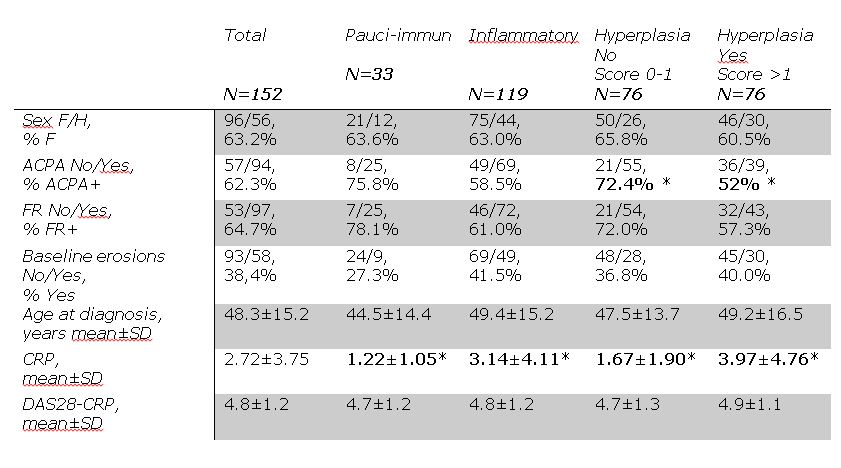Session Information
Date: Saturday, November 7, 2020
Title: RA – Diagnosis, Manifestations, & Outcomes Poster II: Biomarkers
Session Type: Poster Session B
Session Time: 9:00AM-11:00AM
Background/Purpose: Rheumatoid arthritis is a heterogeneous disease with different clinical presentation and prognostic factors including the immune process in the synovium. The development of ultrasound-guided synovial biopsy will enable synovial tissue collection from small joints and will facilitate histopathological studies, thus improving the understanding of the immunopathology in early rheumatoid arthritis (ERA).
The objectives of this ERA cohort are to compare the baseline clinical, biological and radiological characteristics and the clinical response on methotrexate (MTX) according to the histological “inflammatory pattern” of the synovial tissue.
Methods: 152 ERA patients fulfilling the ACR/EULAR 2010 criteria and naïve to DMARDs therapy were recruited from our Brussels Louvain ERA cohort. Synovial biopsies before treatment were obtained using an ultrasound guided needle biopsy (US-NB) of the small joints or miniarthroscopy of the knee. RA disease activity measures including DAS28-CRP were evaluated every 3 months on MTX treatment. Tissues were assessed for quality. Retrieved tissue was fixed, stained and paraffin embedded for blinded tissue pathotype description.
The pathotypes were divided in 2 groups according the absence or presence of inflammatory infiltrates (pauci-immune, score 0-1 vs inflammatory, score 1-6) and absence or presence of synovial hyperplasia (score >1).
Results: The average age of population is 48.3 years. 63.2% of the patients are women. 24.6% are smokers and 62.3% are positive for anti-citrullinated protein antibody (ACPA). Baseline characteristics of the cohort are summarized in Table 1. There was a significant predominant presence of ACPA+ (%) in the group without synovial hyperplasia. CRP levels were significantly higher in patients with the inflammatory pattern than those with the pauci-immune pattern. Synovial hyperplasia was also associated with these parameters.
A significantly higher rate of SJC was observed in the group with synovial hyperplasia compared to the group without hyperplasia.
Clinical response (DAS-44, SJC and CRP) was statistically better after 3 months of MTX treatment in patients with baseline inflammatory and hyperplasia pathotypes and CRP remained lower at 6 and 12 months compared to the pauci-immune group.
Conclusion: Synovial tissue analysis allows us to better define the spectrum of ERA. We have demonstrated a predominance of ACPA positive patients in pauci-immune synovial pathotypes. A better clinical response to MTX was observed in patients presenting inflammatory infiltrates or synovial hyperplasia. Further studies should validate a step change towards personalized medicine in daily clinical practice for disease stratification and treatment selection of ERA.
 Table 1 : Baseline characteristics of the cohort ; (*) P < 0,05
Table 1 : Baseline characteristics of the cohort ; (*) P < 0,05
To cite this abstract in AMA style:
de Montjoye S, Sokolova T, Sapart E, Lauwerys B, Dierckx S, Galant C, Meric de Bellefon L, Nzeusseu Toukap A, Triaille C, Durez P. Synovial Tissue Histopathology Findings in Early RA. Is It Useful? Analysis of the Belgian CAP48 Cohort [abstract]. Arthritis Rheumatol. 2020; 72 (suppl 10). https://acrabstracts.org/abstract/synovial-tissue-histopathology-findings-in-early-ra-is-it-useful-analysis-of-the-belgian-cap48-cohort/. Accessed .« Back to ACR Convergence 2020
ACR Meeting Abstracts - https://acrabstracts.org/abstract/synovial-tissue-histopathology-findings-in-early-ra-is-it-useful-analysis-of-the-belgian-cap48-cohort/
